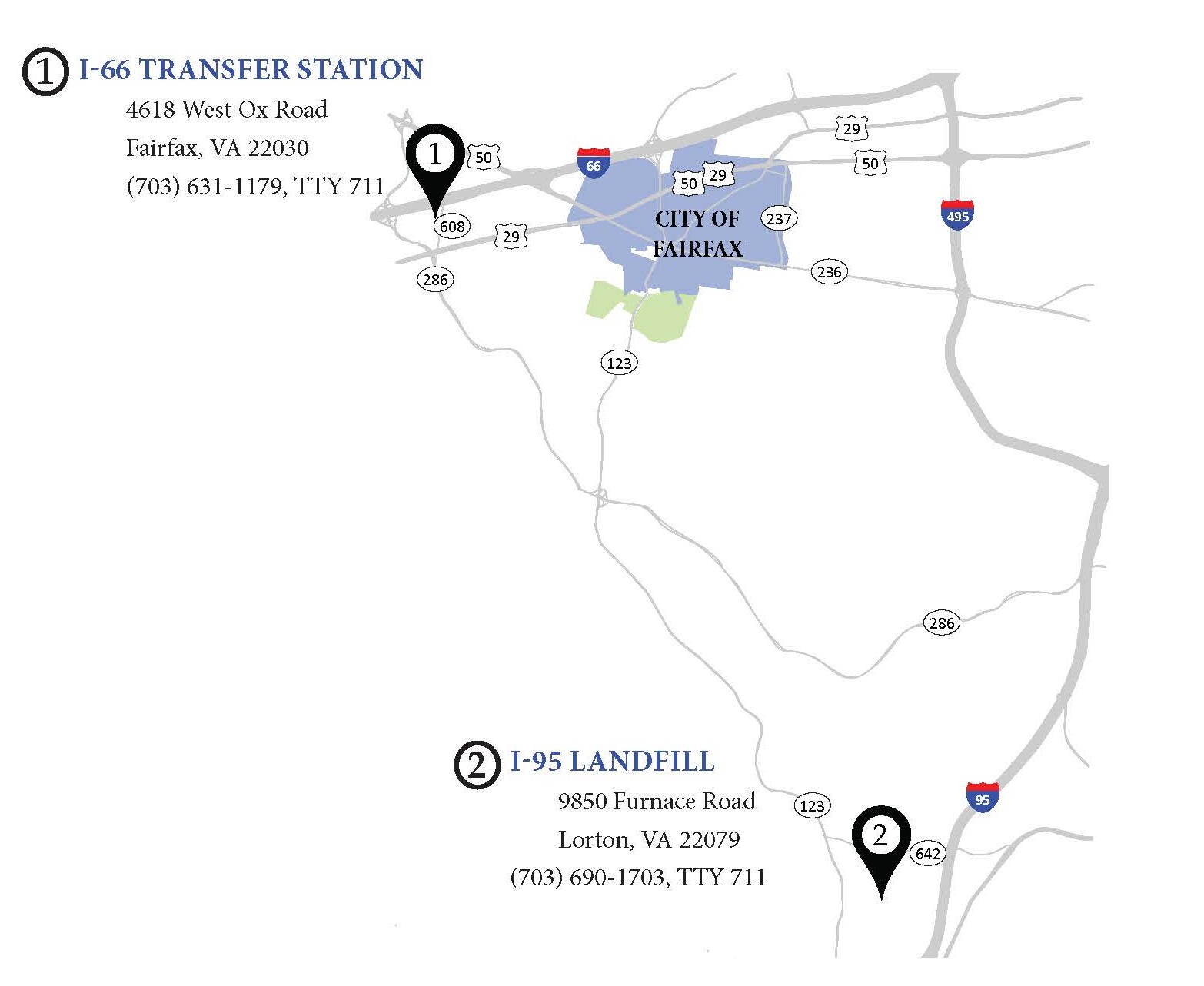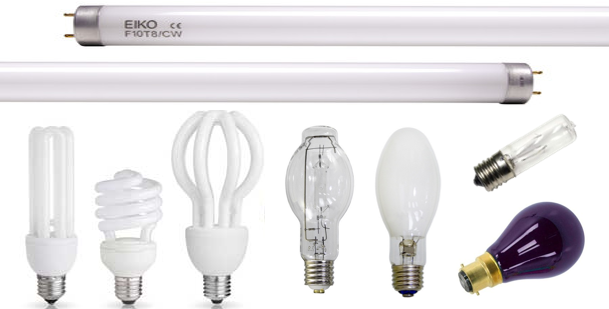Hazardous Waste

Household hazardous waste (HHW) should never be disposed of in the regular trash or poured down the drain. Household hazardous waste refers to used or leftover contents of consumer products that contain materials with one of the four characteristics of a hazardous waste: toxic, ignitable, corrosive, or reactive.
Reason for Special Disposal
Improper disposal of even a small amount of HHW can have major adverse impacts on our air, water, and soil. Household hazardous waste is best managed when it is collected separately from regular municipal solid waste so that it can be handled properly and packaged to minimize exposure to potentially harmful chemicals and will also reduce the likelihood that these hazardous chemicals will enter the environment.
The safest way for residents to dispose of household hazardous wastes is to carefully pack them up and bring them to one of the Fairfax County’s Household Hazardous Waste Collection Sites at the I-66 Transfer Station or I-95 Landfill. See detailed site information below.
Examples of Household Hazardous Waste
- Lighters
- Unbroken light bulbs (LEDs and fluorescent lamps)
- e-Cigarettes
- Mercury products (thermometers and thermostats)
- Pesticides and Herbicides
- Pool Chemicals
- Automobile fluids (motor oil, gasoline, antifreeze, brake fluid, power steering fluid, windshield washer fluid)
- Cooking oil
- Inks and Dyes
- Poisons
- Batteries
- Aerosol sprays (not empty)
- Moth Balls
- Nail polish, and polish remover
- Stains and Varnishes
- Bleach
- Paint and Paint thinner
Download the Fairfax County Household Hazardous Waste Program Brochure for detailed instructions on how to dispose of hazardous waste.
Procedures for Packing and Transporting Household Hazardous Waste
 For safe transportation of household hazardous materials to a designated drop-off center, bring materials in their original container if possible, and make sure lids are tightly sealed. Label materials not in their original container. Place leaking or corroded containers in a large plastic container with a tight-fitting lid.
For safe transportation of household hazardous materials to a designated drop-off center, bring materials in their original container if possible, and make sure lids are tightly sealed. Label materials not in their original container. Place leaking or corroded containers in a large plastic container with a tight-fitting lid.
Place all household hazardous products upright in a cardboard box and secure them in the back seat or passenger seat for transport. Do not place waste in the back seat of cars with children or pets. Do not smoke while transporting hazardous materials. Keep flammables out of direct sunlight and away from sources of heat, spark, flame, or ignition.
Drop-Off Centers
Fairfax City residents may use the Fairfax County Waste and Recycling Drop-Off Centers to dispose of refuse and recycling, household hazardous waste, electronics, glass, compost, and more. Proof of City of Fairfax residency may be required. Acceptable proof includes a driver's license, state ID card, property tax bill, or utility bill.
 I-66 Transfer Station
I-66 Transfer Station
4618 West Ox Road, Fairfax, VA 22030
703-631-1179, TTY: 711
I-95 Landfill
9850 Furnace Road, Lorton, VA 22079
703-690-1703, TTY: 711
For additional information—including the status of services, facility maps, telephone numbers of interest, and more—please visit the Fairfax County Recycling and Trash Locations and Hours page.
Disposal of Challenging Household Items
Light Bulbs
Light bulbs, including incandescent, compact fluorescent, compact fluorescent lamps (CFLs), tube fluorescent, light emitting diodes (LEDs), and string lights all require different disposal techniques. Check with local retailers for recycling take-back programs or visit the Fairfax County Household Hazardous Waste website for proper disposal instructions.
Reference the Safe Lightbulb Disposal flyer(PDF, 76KB) for more information.

Batteries
Different kinds of batteries require specific disposal techniques. Improper disposal can start accidental fires. Check with local retailers for recycling take-back programs or visit the Fairfax County Household Hazardous Waste website for proper disposal instructions.
 City of Fairfax public safety infographic warns residents that improperly disposed batteries can cause deadly fires in garbage and recycling trucks, as illustrated by a burning waste collection vehicle. The image advises that all batteries and electronic items should be disposed of at the I-66 Transfer Station at 4618 West Ox Road, with more information available at fairfaxva.gov/hhw. #FFXCitySustainability
City of Fairfax public safety infographic warns residents that improperly disposed batteries can cause deadly fires in garbage and recycling trucks, as illustrated by a burning waste collection vehicle. The image advises that all batteries and electronic items should be disposed of at the I-66 Transfer Station at 4618 West Ox Road, with more information available at fairfaxva.gov/hhw. #FFXCitySustainability
>
Paint
Latex
 Donate any full or nearly full cans of paint by contacting local charities. Old or used latex paint should be air-dried and placed in the regular trash. To speed up the drying process, mix cat litter or shredded paper into the paint to absorb the liquid.
Donate any full or nearly full cans of paint by contacting local charities. Old or used latex paint should be air-dried and placed in the regular trash. To speed up the drying process, mix cat litter or shredded paper into the paint to absorb the liquid.
Check out this video on latex paint disposal for more information.
Oil or Lead-based Paint
Visit the Fairfax County Household Hazardous Waste website for proper disposal instructions for oil or lead-based paint.
Fire Extinguishers
 Fire extinguishers contain pressurized chemicals designed to put out fires. Whether full or empty, they need to be disposed of as household hazardous waste.
Fire extinguishers contain pressurized chemicals designed to put out fires. Whether full or empty, they need to be disposed of as household hazardous waste.
When do you need to dispose of your fire extinguisher?
- Outer damage such as a broken handle, cracked nozzle, split hose, or a missing locking pin.
- Missing inspection and maintenance sticker or tag.
- The fire extinguisher is more than 12 years old.
- The fire extinguisher has been used.
Medication and Pharmaceuticals
Keeping unused, unwanted, and expired medications in your home can lead to accidental poisoning, overdose, and misuse. Make sure to follow any and all instructions on the medicine packaging to ensure proper disposal.
 Visit the Fairfax County’s How to Dispose of Your Unused or Expired Medications website to take advantage of the many ways to dispose of unused or expired medications, including permanent dropboxes, drug takeback days, and at-home disposal instructions.
Visit the Fairfax County’s How to Dispose of Your Unused or Expired Medications website to take advantage of the many ways to dispose of unused or expired medications, including permanent dropboxes, drug takeback days, and at-home disposal instructions.
Do not flush medicines down the toilet. Medicines can end up in our rivers and streams and contaminate our waterways. Always make sure to dispose of medications properly to ensure the safety of our environment and residents.
Fats, Oils, & Grease (FOG)
Visit the Fairfax County Household Hazardous Waste website for proper disposal instructions for cooking oil. Fats and grease should be poured into a can and left to harden into a solid form and then disposed of in the trash.
When not disposed of properly, FOG can cause blockages in the sanitary sewer, resulting in sewer backups inside a restaurant or spewing wastewater from sewer manholes onto private property and streets. Visit the Fairfax County webpage on Fats, Oils, and Grease for more information on the harmful impacts of FOG, disposal information, and more.